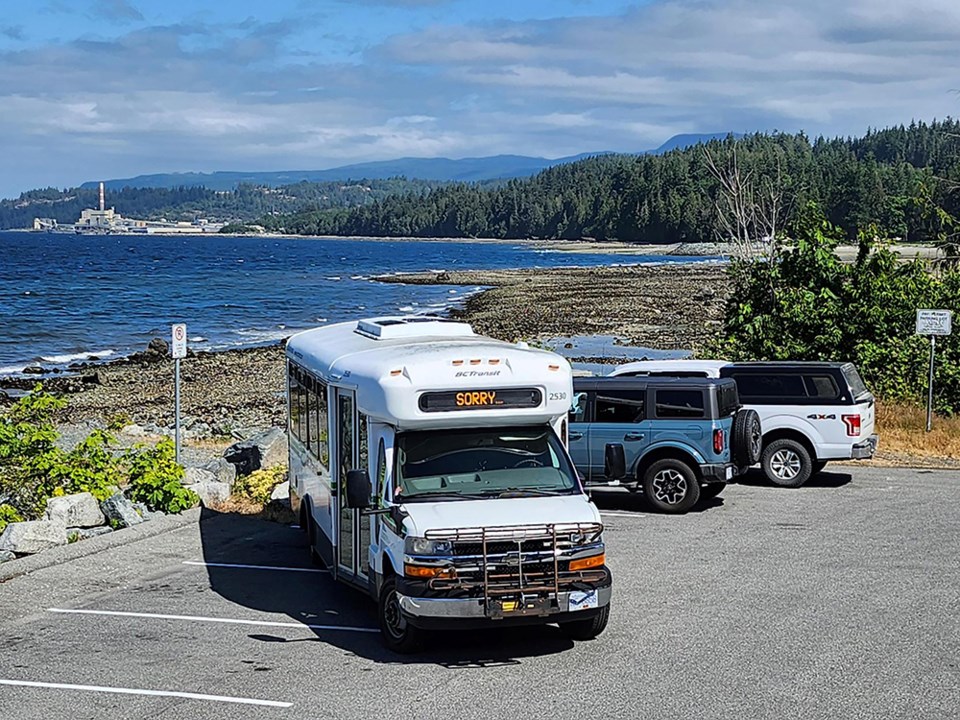qathet Regional District (qRD) directors were provided an overview of BC Transit services in the region and then recommended that the regional board authorize the annual operating agreement be signed.
At the May 22 committee of the whole meeting, Rob Ringma, senior manager, government relations, BC Transit, said he was appearing before the committee to provide a transit update.
In terms of ridership in this region, Ringma said the Powell River Regional Transit System has had a nice return to ridership since the COVID-19 pandemic, which is similar to the provincial trend. He said statistics show ridership at or above 2019 levels, which is “great to see.”
Ringma said for the rural paratransit system operated by BC Transit and the regional district, in 2019, there were 16,701 riders, which was the highest ridership year prior to the pandemic. In 2023, there were 15,322 rides, which was under the 2019 levels but there has been growth each year. Ringma said in 2024, it is expected that the 2019 level will be surpassed.
“These are all good results and consistent with what we see across the province,” said Ringma. “In the summer, ridership really jumps up.”
Ringma said BC Transit has annual operating agreements and every year comes and presents that agreement, which is related to services that will be delivered in the region. He said every year, ridership and revenue projections are revised.
Ringma then reviewed qathet rural paratransit projections and said revenue projections for fiscal year 2024/2025 had been revised upward from $14,726 to $15,041. Total operating costs were $342,330 in 2023/2024 and are projected to be $346,304 in 2024/2025. With lease fees incorporated, total transit costs for 2024/2025 are projected to be $379,613, with the net regional district cost being $165,537.
“All in all, transit costs are pretty much flat with last year and they are also below what we had budgeted in our three-year budget,” said Ringma.
Exchange expansion
He then discussed the planned Town Centre Mall transit exchange. He said BC Transit has worked closely with the mall and City of Powell River. He said it will be an exchange for the entire transit system.
“Every one of our buses kind of meets at that location,” said Ringma. “People transfer from the rural paratransit system into the conventional system at this exchange. It’s an important exchange to BC Transit and the region.
“They [the mall] are basically in the process of rebuilding certain portions of that mall and are relocating the transit exchange. We have worked with them to find a location that is not going to affect our travel times and increase the cost of transit. We’ve come up with a really great spot. It’s a good collaboration effort between private and public partners in terms of coming up with the best design.”
Ringma said the new exchange is slated to be complete by the end of June.
With the downturn of ridership through the pandemic, there was not a large amount of funding for transit expansion, said Ringma. He said with the increase in ridership, pressure is being brought to bear for expansion. The province has allocated significant resources toward transit expansion, but the demand has outstripped resources, so the additional bus request for Texada Island is not going to be accommodated this year, according to Ringma.
“I’m disappointed that we are unable to assist with that request, but what we will do is we will put it back into the mix this year,” said Ringma.
Electoral Area C director and board chair Clay Brander asked about transit through to the Lower Mainland. He asked if there was any consideration given for sending a bus from the lower Sunshine Coast up to the ferry at Earls Cove one or two days per week to take people from qathet region down to Vancouver.
Ringma said with a planned service review, BC Transit will explore connections and opportunities.
“The challenge currently remains,” said Ringma. “We have aligned our schedule to the Sunshine Coast Connector schedule, but that’s a private operator that doesn’t operate every day of the year. It’s mainly a seasonal service. The challenge still remains on the Sunshine Coast side.”
Ringma said there are regional district areas that don’t pay into the transit service on the Sunshine Coast side and it would take involvement of those areas for BC Transit to be able to move forward.
“It’s a topic that comes up on a regular basis and we are ready, willing and able to work on feasibility,” said Ringma.
The committee recommended that the regional board authorize the required BC Transit annual operating agreement to be signed.
Join the Peak's email list for the top headlines right in your inbox Monday to Friday.



